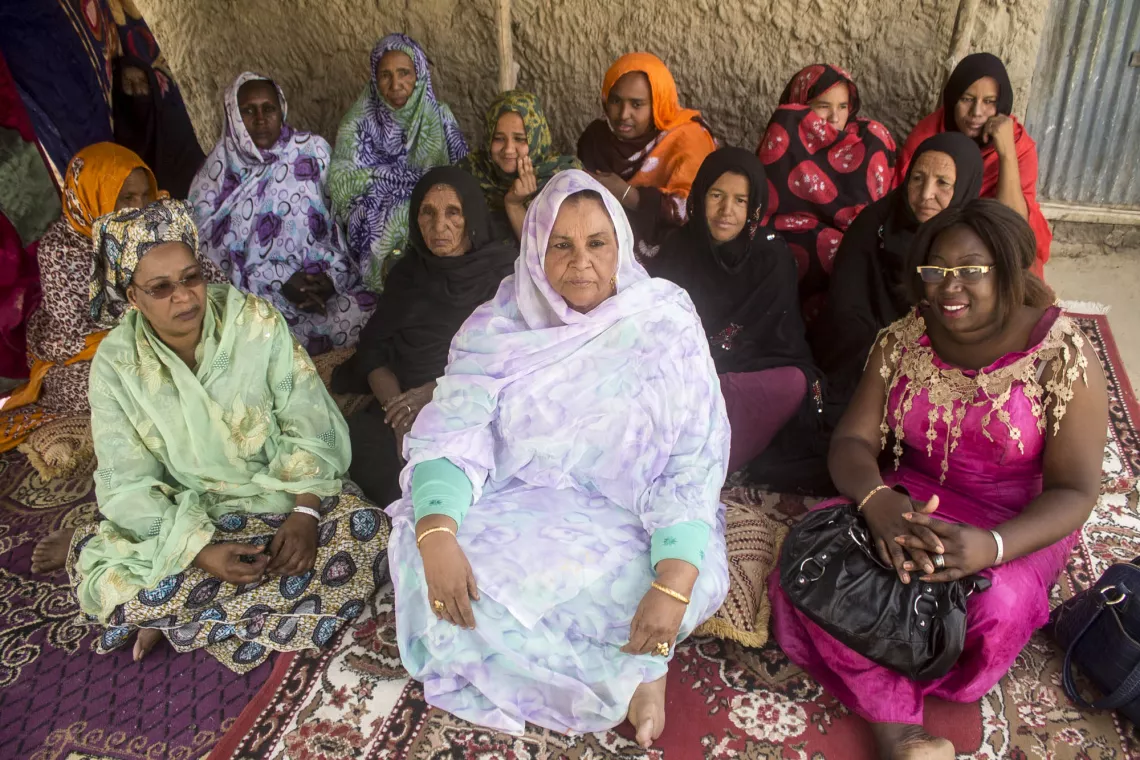Nothing can be done without water
Faced with climate change, communities in Timbuktu have turned to solar energy

- Available in:
- Français
- English
For the nomadic part of Kel Ouli "owners of goats", water is at the heart of development. Faithful to the Tuareg proverb "Aman Imane" ("Water is life!"), water has transformed the lives of families in Barize, in Alafia commune, three kilometers from Timbuktu, northern Mali.
In the middle of sand dunes, nomadic populations have settled around a water point that is becoming a Garden of Eden. Cyclical droughts have forced nomadic communities to settle down. Today, they run a market garden of over one hectare thanks to the support of UNICEF, with funding from the European Union’s humanitarian aid.
Tents and temporary dwellings have given way to permanent, mudbrick houses. Pastoralism has been replaced by income-generating activities including sheep and goat fattening, market gardening and small-scale business. There is a new lease of life, thanks to water.
"The ground seems to have swallowed everything. No more water or pastures, nothing but immense expanses of sand as far as the eye can see."
Water is the main resource through which climate change impacts communities and ecosystems - changing rainfall patterns, floods and rising water levels in some places, lowering water levels and drought in others, accelerating desertification and silting.
Timbuktu, at the edge of the desert, is no exception. From July 2018 to January 2019, many localities in the region were affected by floods, rising waters and erosion. The risk of disasters has led to internal displacement, swelling the ranks of migrants and “climate refugees”.

In Barize, Wartoum Walett Hamallah, President of the Water Management Committee, explains the impact of climate change on the life of the community. “Here the Tuareg have swapped the turban and the veil for the daba (a type of tool) and the watering can. They’ve been forced to take on a new way of life: a sedentary one. We can only rejoice,” she informs us.
“We have no choice because the issues are well known: silting, ecosystem degradation, drought, climate change, etc. Fortunately, thanks to UNICEF, we now have a water point.”
Women like Wartoum are "at the forefront of the fight against climate change through cultivation of market gardens," says Salia Diallo, Water, Hygiene and Sanitation Specialist at UNICEF’s office in Timbuktu.
“The United Nations Climate Change Conference (COP 23) held in Bonn, Germany, in November 2017, also recognized the major role of women in climate action in its Gender Action Plan.”

Wartoum is a great leader in her 60s who cuts a fine figure. She remembers her childhood, when flora and fauna thrived in Timbuktu.
“Women and men sold milk, livestock, hides and leather in the city, or traded their products for grain. Nowadays, the ground seems to have swallowed everything. No more water or pastures, nothing but immense expanses of sand as far as the eye can see.”
She meets with a dozen other women from the organization “Tahanit” (“Kindness”) in a shed. They take stock of the market garden and of the drinking water, hygiene and sanitation infrastructures.
Everything seems to be going well: there’s a large production of potatoes, cabbage, onions, carrots, and moringa. Certain products are used to improve nutrition within the family and prevent child malnutrition. The rest is dried, processed and sold.

This is part of the implementation of the common framework project, which links emergency, rehabilitation and development for Water, Hygiene and Sanitation with emergency, reconstruction and development in northern Mali.
The project, implemented by five international NGOs and UNICEF with funding from the European Union, covered four regions of the country- Timbuktu, Gao, Kidal and Mopti. As an innovation, the project took advantage of solar energy, which abounds in the region, to supply the water tower which provides water for the market garden.
"Women like Wartoum are at the forefront of the fight against climate change through cultivation of market gardens"

Although the project officially ended in June 2015, the leadership and dynamism of the community, with female leaders like Wartoum at its head, as well as regular maintenance of solar panels and other infrastructure, ensured the perfect sustainability of their achievements.
As proof, the actions of the women under the leadership of Wartoum spread to the development of the Tabachabatht site, 15 kilometers from Timbuktu, where women have also taken their destiny into their own hands.
The project is part of UNICEF and its partners’ broader vision: one of using clean and renewable energies to strengthen the resilience of populations affected by insecurity, drought and desertification. The results of the approach continue to be felt through other projects funded by Sweden and Italy.
The results go far beyond strengthening resilience, they are also felt at the level of social cohesion.

As Salia Diallo from UNCEF says: “The experience of cohabitation has shown that every time different ethnic groups have access to water, conflict decreases. That’s thanks to the social intermediation activities that accompany this type of work. Today, families are making use of water here for daily consumption and for their animals, without ethnic or religious distinction.”




